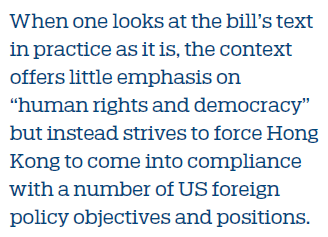HK bill Trojan horse for US foreign policy goals
Updated: 2019-11-25 08:09
(HK Edition)
|
|||||||
Tom Fowdy says Washington is enabling the violent protesters who are tearing city apart
On Wednesday, both houses of the United States Congress passed the Hong Kong Human Rights and Democracy Act - a bill designed to implement sanctions on officials and rescind the city's "special status" if Washington deems certain requirements are not met. Sponsored and pushed by hawkish senators such as Marco Rubio, the bill is expected to be signed by President Donald Trump, despite his personal ambivalence and unwillingness to get involved on the issue. The legislation is expected to cause disruption to US-China relations, with Beijing condemning it as a violation of national sovereignty and intervention in its internal affairs.
The bill is a clear act of opportunism on behalf of those in Congress who seek to further a geopolitical agenda against China and divide the country. When one looks at the bill's text in practice as it is, the context offers little emphasis on "human rights and democracy" but instead strives to force Hong Kong to come into compliance with a number of US foreign policy objectives and positions, including on third-party matters, at the threat of its "special status". In doing so, the act may be accurately described as a "Trojan horse" that seeks to set the city itself against China proper. It is highly disingenuous and has given a green light to radical demonstrators to continue their unacceptable behavior.

To elaborate with evidence on these points, first one ought to turn to Section 205 of the act. Here, the legislation makes a number of demands that Hong Kong come into compliance with what it describes as "export controls" - termed as "any other agreements and forms of exchange involving dual use, critical, or other sensitive technologies". As a separate customs territory, the article aims to incorporate the city into its broader technology war and blacklisting agenda, thus expanding the scope of things such as the Huawei ban and others with the view of taking aim at the Chinese mainland. That in itself is inherently geopolitical, and has nothing to do with the protesters or their demands.
It continues from here in the specified Section 5, where the bill demands "an assessment of the nature and extent of violations of United States export control and sanctions laws occurring in Hong Kong" - in other words, Hong Kong is being obligated, particularly in light of it being a financial center, into following suit with unilateral American sanctions on a number of parties. The bill lists Iran and the Democratic People's Republic of Korea. With sanctions on the former having no international legitimacy whatsoever, and US sanctions on Pyongyang far exceeding UN measures, this is effectively an attempt at "long-arm jurisdiction", forcing the city to follow suit with a number of US foreign policy goals.
This also continues on an unspecified level, with the bill warning the city must follow "international obligations" to the US and setting out that it must take action on anything "that otherwise presents a threat to the national security, foreign policy, or economy of the United States". Because we know how extensive and easily applicable such a label is, Hong Kong is subsequently being strong-armed into not following China's foreign policy, which is Beijing's sovereign right as set out in the Basic Law of Hong Kong and the Sino-British Joint Declaration, but America's own foreign policy goals and preferences.
This means the US, by passing this legislation, is in practice violating the Basic Law itself by aiming to undermine aspects of direct Chinese sovereignty over the city that are legally legitimate and internationally agreed upon. The aim of Washington is to forcefully differentiate the city from China and thus transform it into a bastion for their own foreign policy goals in Asia. Hong Kong should, according to this bill, act against the mainland save its special status is completely negated, thus also offering an opportunity for the US to extend its economic warfare into the city, which has been exempt from aspects of the trade war.
For those engaged in riotous activities themselves, this is a significant enabler of their behavior. Washington's complete unwillingness to acknowledge the violence sends a green light to those pursuing destructive behavior that their actions are completely acceptable and that they may continue to do so with the view of receiving more support from the US and the persistency of a narrative that wrongly blames law enforcement for responding as designated in riot law. This thus poses the risk of perpetuating unrest, instability and chaos in society, which are of course interconnected with Washington's broader goal in its attempt to divide the country.
The author is a British political analyst, writer and columnist. The views do not necessarily reflect those of China Daily.
(HK Edition 11/25/2019 page9)